Student Development through Constructivism in Cooperative Education: A Case Study of the Faculty of Accounting, Rangsit University
Main Article Content
Abstract
The purposes of this research were as follows: 1) to develop students through constructivism in cooperative education and an independent study; 2) to investigate students’ opinions towards the establishments they work for; and 3) to study the achievements of cooperative education. The population consisted of 76 accounting students who enrolled in Cooperative Education Course, Semester 2, Academic Year 2018. The sample of this qualitative study, according to the objective 1 was 3 advisor, students responsible for Auditing, Value Added Tax and Government accounting. The objective 2 and 3 were quantitative study. The sample included 76 participants. Research methodology consisted of participatory observation, in-depth interview and questionnaires. Data analysis applied qualitative content analysis and mean.
However, the qualitative analysis showed that 1) Auditing: student examined income and expenses and found that accounting documents of some expenses were missing. Student developed to become knowledgeable until they knew the purpose and inspection methods of income and expenses. Value Added Tax: student found that there were errors in records and documents were delayed, causing the company to pay a penalty and extra money. Government accounting: Student was assigned to record cash accounting and deposit entry covering income and expenses. The student was suggested that there shall be written in a lease, emphasizing that “If a tenant does not come to receive a rental deposit insurance within the specified period, it will be regarded public revenue.” 2) Students’ opinions toward establishments of internships were at an excellent level. Similarly, 3) The achievements of cooperative education considering from results students received from participating in Cooperative education Project were at an excellent level. The average score of students was at 90.20 in total.
Article Details
Views and opinions appearing in the Journal it is the responsibility of the author of the article, and does not constitute the view and responsibility of the editorial team.
References
Daily news. (2018, April 10). Ministry of Education Produces New Graduates, p.23.
Daily news. (2018, September 12). Dr. Udom points out unemployed graduates reach 72% within 12 years, p.15.
Khammani, T. (2011). Teaching Science: knowledge for organizing effective learning processes. Bangkok: Chulalongkorn University Press.
Marsick, V. J., & Watkins, K. E. (1997). Case study research methods. In R. A. Swanson, & E.F. Holton III (Eds). Human Resource Development Research Handbook; Linking Research and Practice. San Francisco: Berrett-
Koehler Publishers.
Matichon. (2018, August 20). Unemployed graduates reflect quality of national education, p.21.
Matichon. (2019, September 13). 2030, graduates unemployed 72%, need changes to respond to national need,
p.1.
Munintarawong, S. (2018). Issues Related to Internship Practices among Thammasat University’s Students Majoring in Japanese Language. Jsn Journal Special Edition. 8(3). 206-218.
Nuangchalerm, P. (2013). Teaching and learning (2nd ed). Bangkok: Chulalongkorn University Press.
Office of the Education, Council Ministry of Education. (2017). National Education Plan, 2017 - 2036. 10,000 copies. Prikwan Graphic Company Limited. 226 pages.
Office of the Secretary of the National Strategy Committee, Office of the National Economic and Social Development. (2018). National Strategy, 2018 - 2037 (abbreviated version). 22 pages.
Petchrak, S. (2005). Research report on the process of learning to create wisdom in Thailand (2nd ed.). Bangkok: Kurusapa Printing Ladphrao.
Photisita, C. (2009). Science and art of quality research. Bangkok: Amarin Printing.
Pongboriboon, Y. (2010). A case study. Journal of Education, Khon Kaen University. 33(4), 42-50.
Saramanus, S. (2014). The achievement of Cooperative Education Project of the Faculty of Science and Technology. Research. Bangkok: Rajamangala University of Technology Phra Nakhon.
Sariwat, L. (2005). A case study. Bangkok: Odian Store.
Srisa-ard, B. (2010). Research for teachers (3rd ed). Bangkok: Surivasas Printing.
Stake, Robert E. (1988). “Case Study Methods Education Research: Seeking Sweet Water” In Complementary Method for Research in Education. Edited by Richard M. Jaeger. Washington, D.C., American Educational
Research Association.
Stake, R. (1995). The art of cae study research. Thousand Oaks, CA: Sage Publications.
Tadawattanawit, S. (2018). The Characteristics of the Graduates in Accordance with Development of Thailand According the “Thailand 4.0” Economic Model. Dusit Thani College Journal. 12(2), 404-416.
Thairath. (2019, May 25). Thai Cooperative Education: 10 years to sustainable future, p.12.
Wongkiatkhajorn, P. (2016). Guidelines for learning qualitative research. Bangkok: Panyachon Publishing House.
World Bank. (2019). 2030, graduates unemployed 72%, need changes to respond to national need, Matichon
September 13, p.1, p.12.


